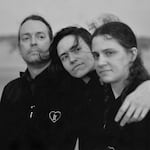Craigslist is often home to niche memes, awkward listings and scams that may or may not mimic a lawless society. But it also brought singer and guitarist Jessa Graves, bass player Kelly Clifton and drummer Aaron MacDonald together in the Portland punk band J. Graves.
“I found Aaron on Craigslist in 2019. Or he found me, rather,” Graves laughs. “One of my top 10 Craigslist finds!” With MacDonald on board and adamant on having another female-identifying and possibly queer musician, Graves then recruited Clifton.

From left to right, Aaron MacDonald, Jessa Graves and Kelly Clifton pose at the Oregon Coast.
Courtesy Dorothy Siemens
We are seated in MacDonald’s basement in Southeast Portland as the band stitches together a timeline of when they first met. Cables hang from walls adorned with bright illustrations painted by the drummer himself. Instruments — a saxophone, a wooden kalimba and a triangle to name a few — are nestled into all corners of the room, with the guitars and the drum set taking center stage.
Black curtains block the sunlight from the windows as warm-toned light bulbs flicker overhead. The room, which is a stark juxtaposition from the raw, gritty sentiment the band embodies, is where Graves, Clifton and MacDonald meet every Thursday and Saturday to jam and work on new music. The basement, in short, is a hotbed for creativity.
The people who now comprise J. Graves came together in early 2020, right before the coronavirus triggered lockdowns worldwide.
“We only played two or three gigs together before things were shut down,” says Graves. For a local band to have performed only a handful of times before being forced indoors is not exactly a roadmap to success. But it was a matter of choice — it was either hit pause on all activities until the world came closer to a state of normalcy or use this time to build on their musical direction. The band went with the latter choice.
The musicians are always up for experimentation — be it with instruments or with concepts. Moreover, the influence of the riot grrrl movement on J. Graves allowed the band to be angry, to be loud, and most importantly, to be authentic.
Watch: J. Graves on how the riot grrl movement changed the look and sound of Northwest music:
After the release of their 2020 EP, “Deathbed,” the three musicians went on to create their next record, only this time, with a twist. In September 2022, the band went on to release “Fortress of Fun,” a seven-song record that takes on a logistically complicated “Choose Your Own Adventure” approach. Each track came with its own music video set to the Oregon Coast that pushed forth the intricate storytelling the three musicians always strived for.
The choose-your-own-adventure concept was brought to life during an album release show at Doug Fir Lounge a few weeks after the record’s release. A host narrated a tale that stitched the show together and provided choices for the audience members — who used heart-shaped paddles — to pick from and push the plot forward. All in all, the set list was literally in the audience’s hands.
But now, J. Graves is ready for something new.
“I think we’re getting weirder,” says Graves. “I think we’re going to do something post-apocalyptic.”
Graves, Clifton and MacDonald are currently writing their next project. In fact, they already have a few songs lined up. While the band does not like to limit themselves to a particular sound or concept, there’s one thing that remains consistent at their core.
“Riot grrrl is very near and dear to my heart,” Graves adds.
She recalls how a Bikini Kill record, “Revolution Girl Style,” spurred the flames within — that they too can make “loud and fast and in-your-face music.” “I remember feeling so empowered… This is for me too.” Most of all, it made Graves realize that representation goes a long way.
“The discovery of riot grrrl in general was a huge jumping off point for me and the music I was writing because representation does matter,” the singer explains. “We might sit here today and say, ‘Well, we want to play music and gender and sexuality doesn’t matter.’ But it does. Especially if you’re told you can’t be there because of those things.”
“For some reason, it’s an issue for some people and it’s just stupid. It’s a stupid thing to get hung up on,” says Clifton. “I don’t have a problem with somebody offering assistance. But when the automatic assumption is, ‘Of course you can’t do that! You’re a woman.’ Get out of here with that.” Both Graves and Clifton field comments like “You’re such a good guitar player for a girl” or “You’re part of a band?”
The two found an incredible and supportive ally in MacDonald and together, are working towards making the music space in the Pacific Northwest more inclusive. The band is pushing for venues to introduce more bills that feature lineups with groups that include more women, queer folks, trans folks and people of color. “Play with anybody other than yourself, because that’s when diverse opinions and perspectives and influences come together,” Graves exclaims.
For J. Graves, riot grrrl drove an important point home — it’s OK to be angry. Furious, even.
“I’m angry about so many things. Thank God for therapy,” Graves adds. “How is my existence a problem for someone? Fuck you! I’m going to do whatever I want to do and I’m going to do it the best I can do. And if that means making art with my friends and promoting the voices that want to speak authentically, then that’s the best place for me to be.”
